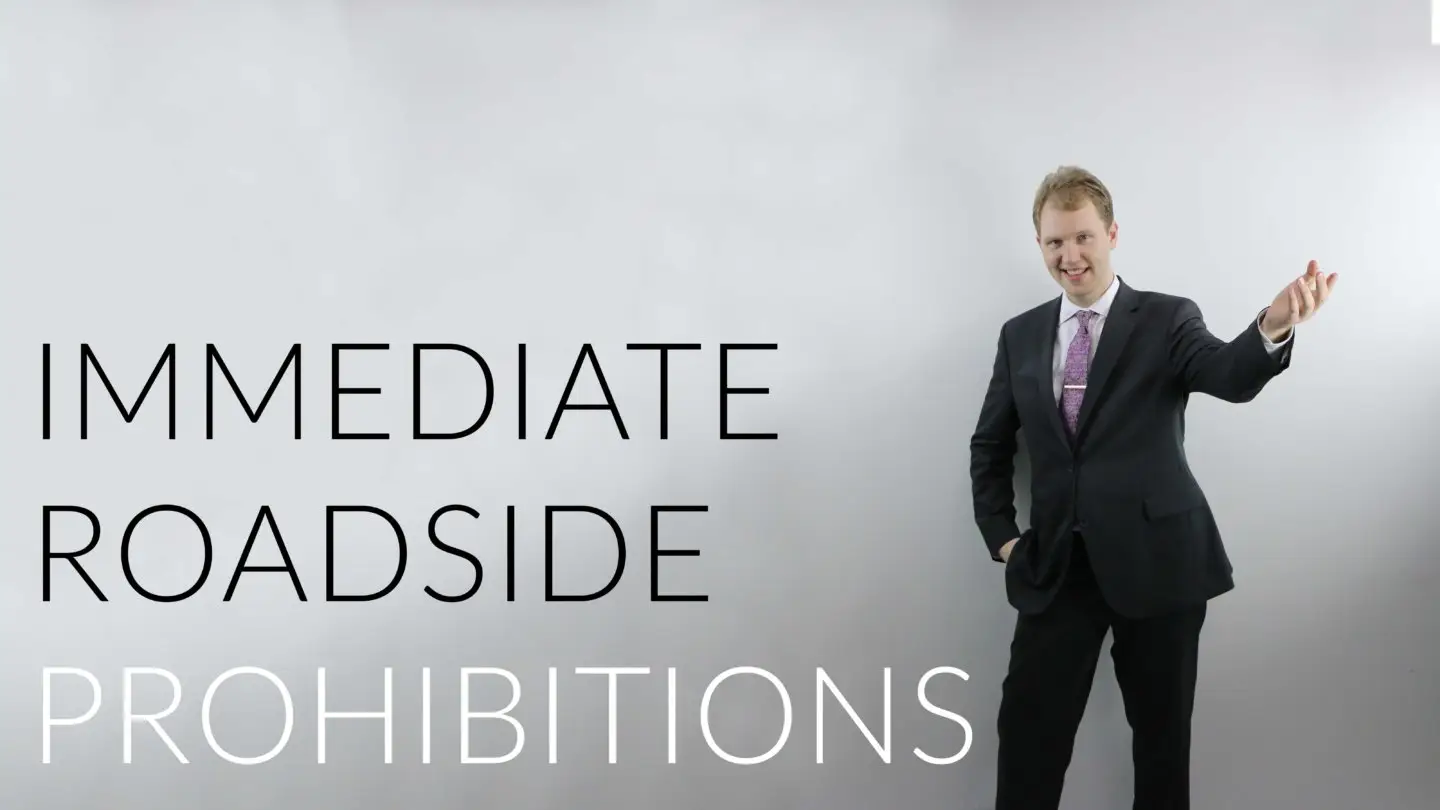If you have recently been stopped by the police as a result of a drinking and driving incident, you are likely bewildered and have lots of questions. ATAC LAW’s team of compassionate and experienced driving lawyers are here to guide you through the process of understanding and fighting your IRP. On this page, we provide some basic information about IRPs, how the dispute process works, and why you should consider retaining ATAC LAW to dispute your IRP.
What is an IRP?
The acronym “IRP” stands for Immediate Roadside Prohibition. IRPs currently only exist in British Columbia and have been around for less than 10 years.
IRPs are not criminal charges and are separate from the Criminal Code offence of driving while impaired. Similarly, IRPs are not the same thing as DUIs. The term “DUI” is an American acronym which stands for “Driving Under the Influence” and is the American equivalent of the Canadian Criminal Code offence of impaired driving.
An IRP is an administrative suspension of your driving privileges within British Columbia. If you hold a British Columbia driver’s licence, ICBC will cancel it once you are served with the IRP and you will be banned from driving within the province for a certain period of time depending on what type of IRP you received. If your roadside breath test resulted in a “WARN” reading, you will be issued a 3-day IRP if it is your first one. If you have a previous 3-day IRP, you will be issued a 7-day IRP. If you have already received one 3-day IRP and one 7-day IRP, then you will be issued a 30-day IRP. If you provide a “FAIL” sample, you will receive a 90-day IRP.
Refusal vs. Failure
There are two different ways which a person can end up receiving a 90-day IRP. The first is by failing a breath test while the second is by refusing to take it.
Generally speaking, failure IRPs are easier to win than refusal IRPs; however, ATAC LAW’s team of experienced driving lawyers have the skills and knowledge to win both types of cases. For instance, an officer may have served you with a 90-day IRP for refusing to take a breath test despite not having proper legal grounds to do so. Alternatively, you may not have been able to provide a breath sample due to a legitimate medical condition; however, the officer decided to issue you a refusal IRP anyway. These are common situations in which lawyers are able to get refusal IRPs thrown out.
There are many arguments which can result in a failure IRP being cancelled. The most common are that there may have been a problem with the Approved Screening Device (“ASD”) (essentially a hand-held Breathalyzer) which rendered its readings unreliable or it may have been calibrated improperly. Similarly, the officer may have made legal mistakes on the prohibition paperwork. Although these defences can be highly technical, our lawyers know how to spot them.
What happens if I don’t fight my IRP?
If you do not dispute your IRP, you will be unable to drive during the applicable prohibition period. Additionally, you will have to pay a monetary penalty as well as a licence reinstatement fee. Depending on the type of IRP received and your past driving record, you will also likely be referred to a “remedial program” such as the Responsible Driving Program (“RDP”) (a counselling and education program) or you will be required to have an Ignition Interlock Device installed in your vehicle under the Ignition Interlock Program (“IIP”). These programs are very costly and can affect your employment and your life. The RDP alone costs $930 and the IIP can costs thousands.
If you decide to continue driving during your prohibition, you risk being charged with Driving While Prohibited—a charge which carries a minimum one-year driving ban, fines, and the possibility of jail time.
How do I fight my IRP?
Because an IRP is not an “offence,” you do not have the right to a trial when you receive an IRP and you do not have the right to be presumed innocent until proven guilty.
In an IRP case, the burden of proof is on you to prove on a balance of probabilities that you should not have received the IRP. Instead of a trial, you will either be given the opportunity to submit written evidence and argument or you will be given a 30-minute teleconference hearing with a government official called an adjudicator. The police will present their evidence in written form and will not be present at the hearing.
IRP hearings are difficult to win for average members of the public. In order to be successful, you will need to know how to analyze the police report, understand technical arguments about the reliability and calibration of the ASD, and be able to make complex legal determinations regarding whether the officer had the proper grounds to make a breath demand to you in the first place. While going it alone is always an option, your odds of winning an IRP will be significantly higher if you receive quality legal advice and support.
Why should I call ATAC LAW when there are so many other IRP lawyers in British Columbia?
At ATAC LAW, we are selective about the cases that we take on. We are honest and upfront with our clients about their odds of success as well as our fees. We also provide high quality customer service. When you want an update from your lawyer about your case, you will get to talk to your lawyer directly. When your lawyer receives a decision, either positive or negative, your lawyer will contact you directly with the results and will provide advice about the next steps in your case. Law firms that handle a larger volume of IRP cases simply cannot provide this level of customer service and must farm out client communication to non-lawyers such as assistants and articled students. If you are having trouble choosing a law firm, we recommend that you thoroughly read each law firm’s Google business reviews. We believe that our clients’ satisfaction speaks for itself.
You need a Driving Lawyer who Knows the Law
CALL YOUR DRIVING LAWYER AT 604-519-0660
We help clients all across BC, not just in Greater Vancouver.
Client
Class 7 “N” Driver with multiple tickets:
- Fail to Display N sign (3)
- Driving in HOV Lane
- Fail to Produce Driver’s License
- Use Electronic Device While Driving
- Client had been prohibited 3 times before
Challenge
The Superintendent wanted to impose a 3-month prohibition.
Result
ATAC LAW succeeded in getting the client’s prohibition cancelled in its entirety.
Client
Class 7 “N” Driver with one of the most series offences – driving without consideration. This ticket was issued because the client cut off a police car.
Challenge
The client faced a six (6) month prohibition.
Result
ATAC LAW succeeded in getting the prohibition shortened from six months to two months – a reduction of 66%.
Client
Class 5 Driver with multiple serious tickets:
- Drive Without Consideration
- Speeding
- Use Electronic Device While Driving
Challenge
The client was facing a two (2) month prohibition.
Result
ATAC LAW succeeded in getting the client’s prohibition cancelled in its entirety.
Client
Class 7 “N” Driver with multiple tickets:
- Fail to Display N sign (3)
- Driving in HOV Lane
- Fail to Produce Driver’s License
- Use Electronic Device While Driving
- Client had been prohibited 3 times before
Challenge
The Superintendent wanted to impose a 3-month prohibition.
Result
ATAC LAW succeeded in getting the client’s prohibition cancelled in its entirety.
Client
Class 7 “N” Driver with one of the most series offences – driving without consideration. This ticket was issued because the client cut off a police car.
Challenge
The client faced a six (6) month prohibition.
Result
ATAC LAW succeeded in getting the prohibition shortened from six months to two months – a reduction of 66%.
Client
Class 5 Driver with multiple serious tickets:
- Drive Without Consideration
- Speeding
- Use Electronic Device While Driving
Challenge
The client was facing a two (2) month prohibition.
Result
ATAC LAW succeeded in getting the client’s prohibition cancelled in its entirety.





